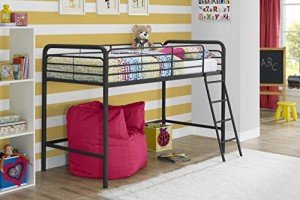15 Unquestionably Good Reasons To Be Loving Bunk Beds
Exploring Bunk Beds: A Comprehensive Guide
Bunk beds have long been a staple in children's bedrooms, dormitories, and even homes with limited space. Cheap Bunk Beds do they supply a useful sleeping service, but they likewise create a fun and imaginative environment for kids and a great space-saver for adults and households. This article will check out everything you require to understand about bunk beds, from types and materials to security tips and buying advice.
Table of Contents
- Kinds Of Bunk Beds
- Traditional Bunk Beds
- Loft Beds
- Triple Bunk Beds
- L-Shaped Bunk Beds
- Product Options
- Wood
- Metal
- Security Considerations
- Purchasing Guide
- Frequently asked questions
Kinds Of Bunk Beds
Bunk beds come in numerous styles to suit various needs and choices. Here's a breakdown of the most typical types:
Conventional Bunk Beds
Conventional bunks typically feature two beds stacked vertically on top of one another. These beds are perfect for brother or sisters sharing a room or for making the most of sleeping space in visitor spaces.
Loft Beds
Loft beds stand likewise to traditional bunk beds but do not have a lower sleeping location. Instead, they typically include a desk or seating location below, making them a great choice for small rooms requiring multifunctionality.
Triple Bunk Beds
Triple bunk beds are created for three residents, with beds stacked in a three-tier setup. These are less typical but can be a fun service for large households or pajama parties.
L-Shaped Bunk Beds
With one bed positioned horizontally and the other vertically, L-shaped bunk beds are typically geared up with additional features such as desks or storage drawers and can complement corner areas in a space.
Contrast of Bunk Bed Types
Bed Type
Suitable Use
Description
Traditional
Shared bedrooms or visitor rooms
2 beds stacked vertically
Loft
Little rooms requiring multi-purpose space
Upper bed with open space beneath
Triple
Big families or pajama parties
3 beds stacked vertically
L-Shaped
Corner or versatile spaces
A mix of vertical and horizontal beds
Material Options
Bunk beds are made from various materials, with wood and metal being the most typical. Each material has its advantages and disadvantages.
Wood
- Durability: Generally robust and can withstand years of use.
- Aesthetic Appeal: Offers a classic look that can mix with different designs.
- Weight Capacity: Typically sturdier; can support heavier weights.
- Drawbacks: May be more expensive than metal choices and can be vulnerable to scratches.
Metal
- Sturdiness: Generally light-weight and simple to move but still strong.
- Modern Design: Often is available in smooth styles, making it appealing for modern areas.
- Economical: Usually cheaper than wooden choices.
- Disadvantages: Can be cold to the touch in winters and may not have the same visual appeal for some purchasers.
Safety Considerations
When it comes to bunk beds, safety can not be neglected. Here are crucial security ideas to remember:
- Guardrails: Ensure that the leading bunk has guardrails on both sides to avoid falls.
- Durable Construction: Check for a strong build and tough materials to hold up against weight and movement.
- Weight Limit: Adhere to the manufacturer's weight limit for both the upper and lower bunks.
- Ladder Design: Choose bunks with a safe, easy-to-climb ladder and prevent any sharp edges or rungs.
- Age Restrictions: Most manufacturers suggest that kids under the age of 6 need to not sleep in the upper bunk.
Purchasing Guide
When searching for bunk beds, think about the following factors to discover the best fit for your needs:
- Space Availability: Measure the room size and ceiling height, ensuring there is appropriate space for the leading bunk.
- Bed Size: Decide between twin, complete, or bigger sizes based on your needs and the size of the room.
- Style Preference: Consider the general design of the bed room to discover an ideal style.
- Reduce of Setup: Look for a bunk bed that is uncomplicated to put together.
- Budget: Bunk beds come in various rate ranges, so identify a budget plan before beginning your search.
FAQs
1. What is the suggested age for children to sleep on the leading bunk?
Kids aged six and older are normally suggested to sleep on the top bunk to reduce the threat of falls.
2. How can I make my bunk bed much safer?
To improve security, ensure guardrails are properly set up and check that the bed is positioned on a flat surface area. Furthermore, motivate kids to utilize the ladder thoroughly.
3. Can I transform a bunk bed into two different beds?
Numerous bunk beds are developed to be convertible. Check the manufacturer's requirements for convertibility features.
4. What devices are offered for bunk beds?
Typical accessories include beddings, storage drawers, staircases rather of ladders, and tented canopies for a fun visual appeal.
5. How do I preserve my bunk bed?
Regular look for loose screws or structural integrity can assist guarantee safety. Dust the bed routinely and clean spills quickly to keep the products in good condition.
Bunk beds are flexible and a space-efficient option for numerous living scenarios, from children's spaces to guest lodgings. With lots of styles and products readily available, possible buyers have a wealth of choices to consider, making sure a mix of functionality and aesthetic appeals. By prioritizing safety and following the tips laid out in this guide, people can find the best bunk bed that fits their space and way of life, all while producing a pleasurable sleeping environment.
